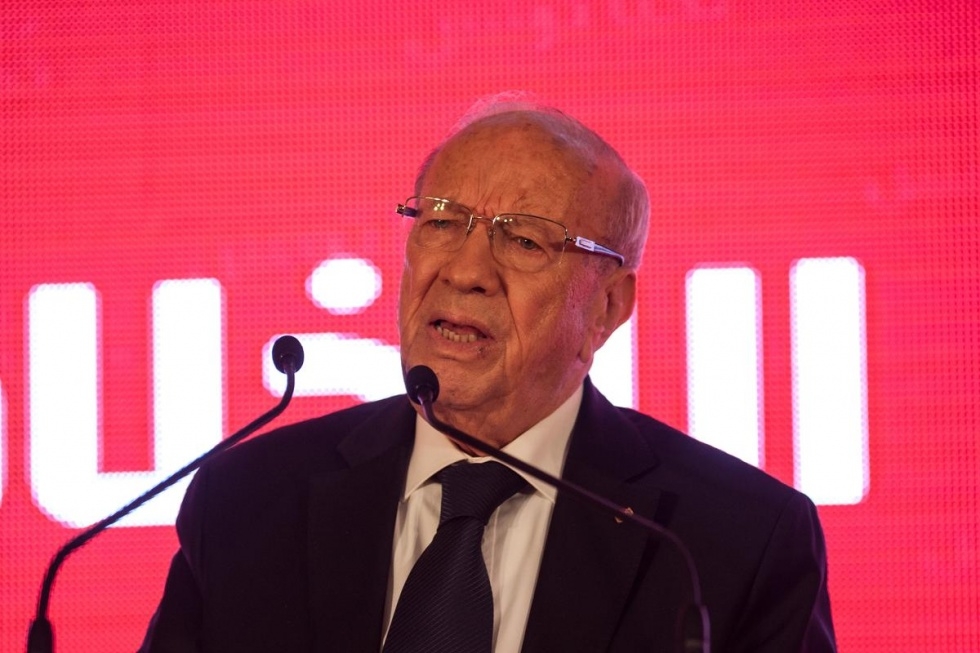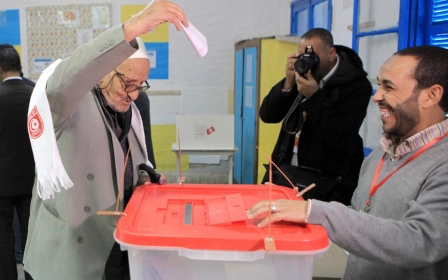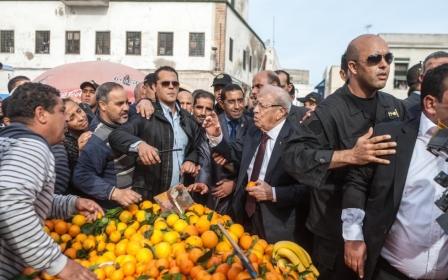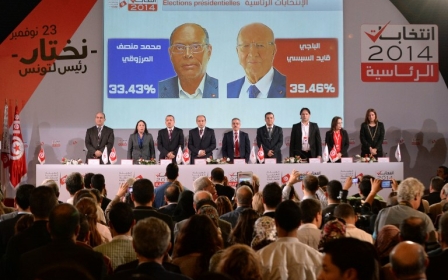Essebsi: Bourguiba Incarnate?

As the run-off for the presidency of Tunisia approaches, leading candidate, Beji Caid Essebsi is banking heavily on his connection to Tunisia's first president, Habib Bourguiba, to secure a victory.
Internationally, Mr Essebsi has been painted as the leader of an anti-Islamist charge against the Ennahda party, but domestically the veteran politician has promoted himself less by opposing religious politics and more by channelling admiration for a bygone leader.
88-year-old Essebsi is a veteran politician who served in numerous high-level roles under Tunisia's autocratic post-independence president, Habib Bourguiba.
As early as 1965, Essebsi was appointed interior minister under Bourguiba, a role he held for more than four years before being made minister of defence in 1969. Essebsi then went on to serve in the highly sought-after post of Tunisian ambassador in Paris.
In 1980, Essebsi was recalled by Bourguiba to serve as minister delegate to then prime minister, Mohamed Mzali, and in 1981 he became minister of foreign affairs, a position he held for more than five years until the near end of Bourguiba's reign.
In addition to his ministerial posts Essebsi also authored a book, “Habib Bourguiba: Le bon grain et l'ivraie (the wheat and the chaff)”, which forms his own personal account of the Bourguiba years and details how Essebsi believes Bourguiba fundamentally shaped modern Tunisia.
Essebsi also served three times as MP for the Tunis constituency, both under Bourguiba and ousted leader, Zine El Abidine Ben Ali, and in 1990 became president of the chamber of deputies during the Ben Ali regime.
But far from seeking to underplay his pre-revolutionary regime role, Essebsi has carefully marketed himself as a Bourguiba successor. When Essebsi launched his presidential campaign on 2 November, he chose to do so at the mausoleum of Habib Bourguiba in the city of Monastir.
For some, Mr Essebsi's pitch to return the stability of old is highly attractive. “Beji will be just like Habib Bourguiba and will bring back pride to Tunisia,” said Mr Riahi, a transit manager for Tunisair.
“He is old in years, but he has the mind to match and is a real leader. He has the stateman's knowledge of how to get things done,” he said.
However, Bourguiba's legacy is mixed. Although he is credited with spreading education and advancing women's rights, his rule was also decidedly authoritarian with little room allowed for dissident and little democratic decision making. In all three of the presidential elections held under Bourguiba (in 1964, 1969, and 1974) the President received 100 percent of the vote.
Essebsi's use of the Bourguiba legacy has also been criticised by Bourguiba supporters, some of whom have pointed out that Essebsi did not side with the ageing autocrat when Ben Ali effectively removed him from power in 1987.
However, Essebsi's strategy of using his Bourguiba connection appears to have brought significant success. Essebsi led the first round of Presidential elections with 39.5 percent of the vote to Marzouki's 33.4 percent after other old regime figures threw their support behind him at the last minute.
In October's parliamentary elections, Essebsi's party Nidaa Tounes took 38 percent of the vote, beating out rivals Ennahda by 10 percentage points.
Essebsi's pitch has also found favour outside of Tunisia. Following a trip to the United Arab Emirates by Essebsi in May, a gift of two luxury bulletproof cars was delivered to Nidaa Tounes from the Emirates.
Essebsi's opponent, Marzouki has made attempts to use his Bourguiba strategy against him. At a rally in the town of Beja on 12 December, Marzouki claimed an Essebsi victory would “bring the country back to square one and ensure the return of the old regime”.
“Tunisia would lose everything that it has achieved in the three years since the revolution," Marzouki told assembled supporters.
For their part, Nidaa Tounes have criticised Marzouki's rhetoric and accusations of fraud in the first round of elections as a “threat to social peace”.
The Islamist Ennahda party chose not to field a candidate in the race, and at an Ennahda Shura council meeting on 13 December, the party decided to go further still and remain neutral in the election, refraining from backing Moncef Marzouki's bid.
The decision was far from unanimous. High profile members including former Prime Minister, Hamadi Jebali dissenting from the decision threatened to split the party, according to Vice President, Abdelfattah Morou.
Ennahda's decision is likely to Essebsi's benefit. However privately Nidaa Tounes campaigners concede that this presidential campaign will be Essebsi's last, win or lose.
Whether Tunisians will be sufficiently convinced by his pledge to return the supposed glory of the Bourguiba days, or he will become merely the last chaff of a dying legacy to be separated from the wheat remains to be seen.
Middle East Eye propose une couverture et une analyse indépendantes et incomparables du Moyen-Orient, de l’Afrique du Nord et d’autres régions du monde. Pour en savoir plus sur la reprise de ce contenu et les frais qui s’appliquent, veuillez remplir ce formulaire [en anglais]. Pour en savoir plus sur MEE, cliquez ici [en anglais].




